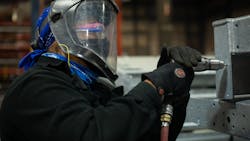Manufacturers report 'slight improvement' in labor, supply chain challenges: ISM
Economic activity in the manufacturing sector grew in November, with the overall economy achieving an 18th consecutive month of growth, say the nation’s supply executives in the latest Manufacturing ISM Report On Business.
The November Manufacturing PMI registered 61.1 percent, an increase of 0.3 percentage point from the October reading of 60.8 percent. A reading above 50 percent indicates that the manufacturing economy is generally expanding; below 50 percent indicates that it is generally contracting. A Manufacturing PMI above 43.1 percent, over a period of time, generally indicates an expansion of the overall economy.
“The U.S. manufacturing sector remains in a demand-driven, supply chain-constrained environment, with some indications of slight labor and supplier delivery improvement.” Timothy R. Fiore, chair of the ISM manufacturing business survey committee, said. “All segments of the manufacturing economy are impacted by record-long raw materials and capital equipment lead times, continued shortages of critical lowest-tier materials, high commodity prices and difficulties in transporting products.
“Coronavirus pandemic-related global issues—worker absenteeism, short-term shutdowns due to parts shortages, difficulties in filling open positions and overseas supply chain problems—continue to limit manufacturing growth potential.”
Nonetheless, panel sentiment remains strongly optimistic, with 10 positive growth comments for every cautious comment. Panelists remain focused on the importance of improving supply chain issues to respond to ongoing high levels of demand, according to the survey.
What respondents are saying
- “Large volume drops due to chip shortage.” [Transportation Equipment]
- "While steel plate and hot-rolled coil pricing seems to be approaching a plateau, the biggest challenge we have at the moment is finding qualified workers.” [Fabricated Metal Products]
- “In the first nine months of the year, business conditions were off the charts, and sales by far outpaced capacity. This has put backlog at record levels and, surprisingly, customers have been willing to wait, albeit reluctantly. However, there seems to be a flattening: Sales remain strong but are not growing at the same month-over-month pace from the previous six to nine months.” [Machinery]
- “We are experiencing significant supply chain disruptions, which are resulting in historically long lead times to get product to our customers. Commodity-based inflationary pressures are widespread, and traditional means of addressing these pressures are not effective due to unprecedented demand.” [Miscellaneous Manufacturing]
Broadly, demand expanded, with the (1) New Orders Index growing, supported by continued expansion of the New Export Orders Index, (2) Customers’ Inventories Index remaining at a very low level and (3) Backlog of Orders Index staying at a very high level.
Consumption (measured by the Production and Employment indexes) grew during the period, with a combined 3.5-percentage point increase to the Manufacturing PMI® calculation. The Employment Index expanded for a third month, with some indications that the ability to hire is improving, partially offset by the challenges of turnover and backfilling.
Inputs—expressed as supplier deliveries, inventories, and imports—continued to constrain production expansion, but there are early signs of supplier performance improving. The Supplier Deliveries Index slowed again but at a slower rate, while the Inventories Index expanded more slowly. In November, the Prices Index expanded for the 18th consecutive month, at a slower rate, indicating continued supplier pricing power and scarcity of supply chain goods.
